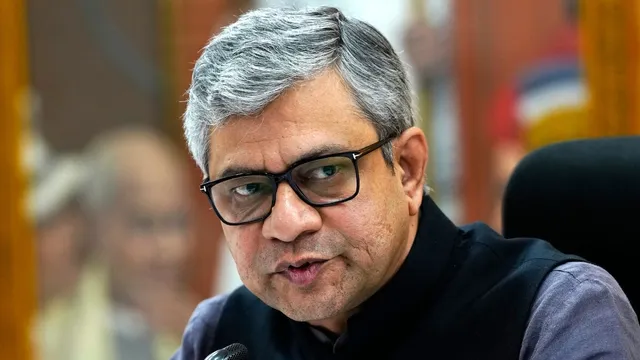- By Soumyaroop Mukherjee
- Tue, 07 Oct 2025 06:23 PM (IST)
- Source:JND
Four new railway projects were unveiled by the Union Cabinet to provide a major boost to the nation’s rail infrastructure. Projects worth Rs 24,634 were approved in a meeting chaired by Prime Minister Narendra Modi. The four projects approved by the Union Cabinet covered 18 districts of Maharashtra, Madhya Pradesh, Gujarat, and Chhattisgarh. The proposed plan will expand the Indian Railways network by approximately 894 km.
VIDEO | Delhi: In a media briefing after today’s cabinet meeting, Union Minister Ashwini Vaishnaw says, "In today's cabinet meeting, we have approved four new railway projects. Seven railway corridors carry 41% of total railway traffic. We have undertaken many projects recently… pic.twitter.com/sgLsarpOPw
— Press Trust of India (@PTI_News) October 7, 2025
"In today's cabinet meeting, we have approved four new railway projects. Seven railway corridors carry 41% of total railway traffic. We have undertaken many projects recently to strengthen and further connect these corridors. Now, we have decided to make a minimum of four lanes, and where possible, six lanes in these corridors," said Union Minister Ashwini Vaishnaw in a media briefing after the meeting.
ALSO READ: Prayagraj Airport Runway Closed After IAF Plane Malfunctions; Air Traffic Halted
What Are The Proposed Routes?
The following routes have been approved by the Union Cabinet:
Maharashtra: Wardha to Bhusawal (3rd & 4th line) spanning 314 km
Maharashtra and Chhattisgarh: Gondia to Dongargarh (4th line) spanning 84 km
Gujarat and Madhya Pradesh: Vadodara to Ratlam (3rd & 4th line) spanning 259 km.
Madhya Pradesh: Itarsi to Bhopal to Bina (4th line) spanning 237 km.
"The approved multi-tracking project will enhance connectivity to approximately. 3,633 villages, which are having a population of about 85.84 lakh and two Aspirational Districts (Vidisha and Rajnandgaon)," the Cabinet said in a press release. The multi-tracking project will also provide rail connectivity to major tourist destinations like Sanchi, Satpura Tiger Reserve, Rock shelter of Bhimbetka, Hazara falls, Nawegaon National Park, etc.
ALSO READ: BSF Recovers Pakistan-Made Ammunition From Border Areas Of Punjab’s Tarn Taran
The projects are planned under the PM-Gati Shakti National Master Plan, which looks to streamline operations and alleviate congestion. These corridors are also critical for the transport of commodities such as coal, containers, cement, fly ash, food grains, and steel. The capacity augmentation works will result in additional freight traffic of magnitude 78 Million Tonnes Per Annum.
As rail is an energy-efficient and environmentally friendly mode of transport, the projects are expected to contribute to lower logistics costs, reduce oil imports by 28 crore litres, and cut CO2 emissions by 139 crore kg, equivalent to the carbon absorption of six crore trees.

